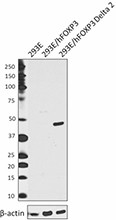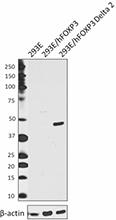- Clone
- A15080A (See other available formats)
- Regulatory Status
- RUO
- Other Names
- Forkhead box protein P3, Scurfin, JM2, IPEX, Zinc finger protein JM2
- Isotype
- Mouse IgG2a, κ
- Ave. Rating
- Submit a Review
- Product Citations
- publications

-

Total cell lysates (15 µg protein) from 293E untransfected (lane 1), 293E transfected with human FOXP3 (lane 2), and 293E transfected with human FOXP3 Delta2 (lane 3) were resolved by 4-12% Bis-Tris gel electrophoresis, transferred to nitrocellulose, and probed with 0.1 µg/mL purified anti-FOXP3 Delta 2 (exon 2 deleted) antibody (clone A15080A). Proteins were visualized using an HRP goat anti-mouse-IgG secondary antibody (clone Poly4053) and chemiluminescence detection. Direct-Blot™ HRP anti-β-actin antibody (clone 2F1-1) was used as a loading control.
| Cat # | Size | Price | Quantity Check Availability | Save | ||
|---|---|---|---|---|---|---|
| 694802 | 100 µg | 212€ | ||||
FOXP3 is a transcription factor which is proposed to be a master regulatory gene and more specific marker of T regulatory cells than most cell surface markers (such as CD4 and CD25). Transduced expression of FOXP3 in CD4+/CD25- cells has been shown to induce GITR, CD103, and CTLA4 and impart a T regulatory cell phenotype. FOXP3 is mutated in X-linked autoimmunity-allergic dysregulation syndrome (XLAAD or IPEX) in humans and in "scurfy" mice. Overexpression of FOXP3 has been shown to lead to a hypoactive immune state suggesting that this transcriptional factor is a central regulator of T cell activity. In human, unlike in mouse, two isoforms of FOXP3 have been reported: one (FOXP3) corresponding to the canonical full-length sequence; the other (FOXP3 delta 2) lacking exon 2. This antibody reacts to human FOXP3 delta 2 (exon 2 deleted) form and weakly reacted to the full-length FOXP3.
Product DetailsProduct Details
- Verified Reactivity
- Human
- Antibody Type
- Monoclonal
- Host Species
- Mouse
- Immunogen
- Human FOXP3 delta2 (exon 2 deleted) peptide conjugated to KLH.
- Formulation
- Phosphate-buffered solution, pH 7.2, containing 0.09% sodium azide.
- Preparation
- The antibody was purified by affinity chromatography.
- Concentration
- 0.5 mg/ml
- Storage & Handling
- The antibody solution should be stored undiluted between 2°C and 8°C.
- Application
-
WB - Quality tested
- Recommended Usage
-
Each lot of this antibody is quality control tested by Western blotting. For Western blotting, the suggested use of this reagent is 0.1 - 0.5 µg per ml. It is recommended that the reagent be titrated for optimal performance for each application.
- Application Notes
-
This antibody is against human FOXP3 delta 2, molecular weight of 43 kD, and weakly reacts with full length human FOXP3, molecular weight 47 kD.
- RRID
-
AB_2650734 (BioLegend Cat. No. 694802)
Antigen Details
- Structure
- Forkhead/winged-helix transcription factor family, exon 2 deleted, approximately 43 kD, contains zinc finger and forkhead domains
- Distribution
-
Nuclear; expressed in T regulatory cells.
- Function
- Transcription factor proposed to be a master regulatory gene in T regulatory cell development and a critical factor for immune homeostasis.
- Interaction
- IKZF3, STUB1, HSPA8 and HSPA1A/B, PPP1CA, PPP1CB, PPP1CG, KAT5, HDAC7, HDAC9, USP7, RUNX1, RORC, RUNX2, RUNX3 and IKZF4.
- Cell Type
- Tregs
- Biology Area
- Cell Biology, Cell Proliferation and Viability, Chromatin Remodeling/Epigenetics, Immunology, Innate Immunity, Signal Transduction, Transcription Factors, Ubiquitin/Protein Degradation
- Antigen References
-
1. Kristensen B, et al. 2015. Clin. Exp. Immunol. 180:58.
2. Roncador G, et al. 2005. Eur. J. Immunol. 35:1681.
3. Mayack S, et al. 2006. J. Immunol. 176:2059.
4. Yang ZZ, et al. 2006. Blood 107:3639.
5. Gavin MA, et al. 2006. Proc. Natl. Acad. Sci. USA 103:6659.
6. Groh V, et al. 2006. Nature Immunology 7:755.
7. Lewkowicz P, et al. 2006. J. Immunol. 177:7155.
8. Luke PP, et al. 2006. Am. J. Transplant. 6(9):2023.
9. Bamias G, et al. 2007. J. Immunol. 178:1809.
10. Valencia X, et al. 2007. J. Immunol. 178:2579.
11. Davidson TS, et al. 2007. J. Immunol. 178:4022. - Gene ID
- 50943 View all products for this Gene ID
- UniProt
- View information about FOXP3 on UniProt.org
Related FAQs
- Can FOXP3 be costained with cytokines?
-
The larger holes created by the nuclear permeabilization required for FOXP3 may allow cytokines to leak out of the cell, making it harder to detect lowly-expressed cytokines. You may have to use a control where the cells are only permeabilized through the cell membrane.
Other Formats
View All FOXP3 Reagents Request Custom Conjugation| Description | Clone | Applications |
|---|---|---|
| Purified anti-human FOXP3 Delta 2 (exon 2 deleted) | A15080A | WB |
Compare Data Across All Formats
This data display is provided for general comparisons between formats.
Your actual data may vary due to variations in samples, target cells, instruments and their settings, staining conditions, and other factors.
If you need assistance with selecting the best format contact our expert technical support team.
-
Purified anti-human FOXP3 Delta 2 (exon 2 deleted)

Total cell lysates (15 µg protein) from 293E untransfected (...
 Login / Register
Login / Register 







Follow Us